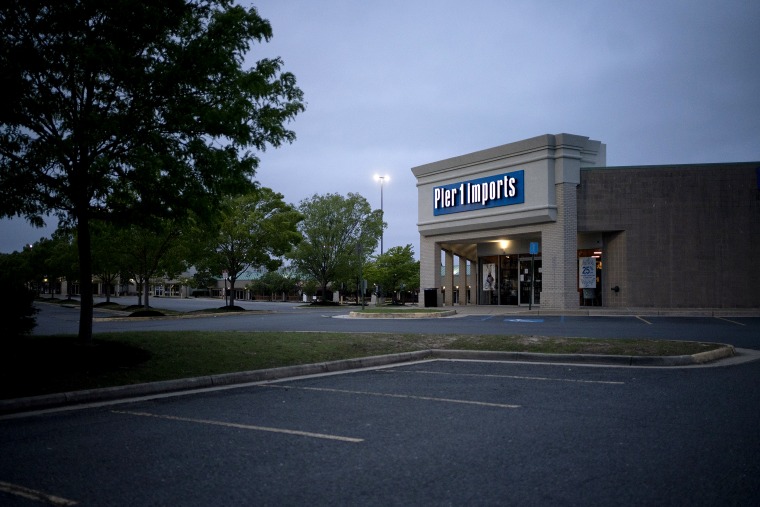What do Dressbarn, Pier 1 Imports — and Modell's Sporting Goods — have in common beyond their retail downfall? They have all been targeted by a little-known Florida-based investment firm run by a former NASA scientist and a serial entrepreneur aiming to buy iconic American brands and turn them into e-commerce businesses.
Retail Ecommerce Ventures, founded by Tai Lopez and Alex Mehr, has been scooping up distressed retailers almost as fast as they fall, looking to flip rusty brick-and-mortar brands into lean e-commerce brands.
On Thursday, the holding company was the highest winning bidder for Modell’s Sporting Goods intellectual property and other assets related to its e-commerce business, for $3.7 million, according to people familiar with the matter.
The firm acquired Dressbarn in November for an undisclosed amount, and Pier 1 in June for $31 million. If approved, Modell’s would be their third major retail acquisition in just eight months.
“Sporting goods is a ginormous market,” said Mehr, REV's CEO, a former aerospace scientist and the co-founder of Zoosk, the online dating app, which he sold last year for $300 million. “If you look at people who aren’t into sports, they know of Modell’s — it’s well-respected and an old brand. It's something people have grown up with.”
Modell’s did not respond to NBC News’s request for comment.
Mehr and Lopez first launched REV last year as retailers saw record numbers of store closures, with many falling into bankruptcy. The company eyed retailers such as American Apparel, Barnes & Noble and Forever 21 for an acquisition, but ultimately decided the price for the intellectual property was too high to take on the risk of turning around the brand, Lopez, REV's president, told NBC News.
“COVID-19 hit and it really created an opportunity to buy really good brands that we felt had just been victim to the times but could be brought online, like Pier 1,” Lopez said.
Lopez and Mehr first bonded a decade ago over books and their shared admiration for Warren Buffet, who wrote in a 2008 New York Times opinion editorial, “Be fearful when others are greedy, and be greedy when others are fearful.”
The company has its focus squarely on paying discount prices for the intellectual property of high-volume businesses with strong brand affinity, said Lopez. During negotiations, the company skips taking over expensive real estate and opts for rights to use the brand and take it online — a business that many struggling retailers who find themselves in bankruptcy have failed to do.
For most of its deals, the company purchases the assets with a mix of debt and equity. Its investments generate revenue from the debt principal, but also they may grow into positive cash flow businesses, Lopez said.
Dressbarn saw its sales increase 165 percent from the first quarter of this year to the second quarter with forecasted annual sales of roughly $65 million, Mehr told NBC News.
Dressbarn is now dramatically leaner than it was as a brick-and-mortar store. At the time it filed for bankruptcy, the company employed about 9,000 people. Under its new structure, the entire business is run by 30 people.
When Dressbarn filed for bankruptcy, it had about 9,000 employees. Now, the entire business is run by 30 people.
“We are lean and leveraging tech to do something that would have taken hundreds of people to run,” said Shayan Zadeh, CEO of Dressbarn and former co-founder of Zoosk with Mehr. “Our whole team, running this $65 million business, is 30 people.”
Only about 15 percent of the new Dressbarn business is made up of past employees, he said.
The company’s business structure depends largely on Shopify Plus, a product of the Shopify e-commerce platform used by brands such as Staples, Heinz and Khloe Kardashian’s Good American. REV companies are built on top of the platform and use a mix of direct-to-consumer shipping and drop-shipping to decrease costs, said Lopez.
“What we’re doing is the same thing as internet startups with one major difference — instead of building a startup, we could just buy a massive brand with a built-in customer base and brand affinity and awareness and jumpstart it,” Mehr said. “It’s a hybrid model.”
The company is just one of about a dozen or so firms interested in buying ailing retailers’ intellectual property to revamp the brand and leave expensive real estate leases behind, according to Dave Peress, executive vice president of Hilco Global’s retail services. Private equity-backed Authentic Brands Group and Simon Property — through their joint venture, called SPARC Group — bought the intellectual property assets for Aeropostale and Nautica. This year the joint venture also bought Forever 21’s intellectual property and leases.
These deals also come with valuable customer lists, brand awareness and information, Peress said. Customers are expensive to acquire, and some of the leading tech startups such as Casper had to spend more than $400 million on marketing over four years before going public, reports show.
“What are those customers worth and where can they take that brand?” said Stephen Miller, co-president of SB360 Capital Partners and former co-CEO of Polaroid and Linens 'n Things, which is now also owned by REV. “You don’t have to be a startup that can pay a zillions dollars for brand awareness.”
It’s unclear how far a business model based on reanimating ailing retailers might go, but Retail Ecommerce Ventures and other firms circling bankruptcy companies are bullish.
“We see this as a once in a lifetime opportunity,” Lopez said. “We just hunt for deals.”
